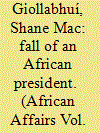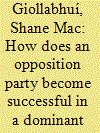| Srl | Item |
| 1 |
ID:
154509


|
|
|
|
|
| Summary/Abstract |
The entry of the ANC into the arena of democratic politics provoked a dilemma for the party leadership that is familiar to political parties in a new democracy: how, if at all, should the party reform its internal organization to compete in a new electoral environment? This article draws on interviews with senior members of the ANC to develop a theory that describes how the ‘modernization’ of the ANC under President Thabo Mbeki led to his electoral defeat at the party's national conference in 2007. It contends that the process of modernization reduced systematically the role of the party's activist base in the policy-making process, creating a motive to replace the President, but left intact the role of activists in the selection of the party's leadership, which in turn provided an opportunity to replace the President at the party's national conference. The President's opponents exploited ruthlessly this opportunity by enlarging and mobilizing the party membership, using a clientelistic appeal for support, to deliver a resounding victory for their champion, Jacob Zuma. This type of clientelistic competition, which has become routine inside the ANC, undermined the democratic legitimacy of the party and its capacity to govern in the public interest.
|
|
|
|
|
|
|
|
|
|
|
|
|
|
|
|
| 2 |
ID:
169775


|
|
|
|
|
| Summary/Abstract |
The African National Congress has long been the brightest star in the firmament of the party system in South Africa, but its eminence is fading in the face of a rising Democratic Alliance. The success of the Democratic Alliance is instructive. The party barely survived the passage to majority-rule, but nonetheless escaped the gravitational pull of its historically narrow support base to challenge effectively for power across South Africa. The question is how has it come to present a credible challenge to the ANC, and whether there are broader lessons to draw from this example of a successful opposition in an African democracy. This article presents a theory explaining how the leadership of the Democratic Alliance made an expensive, unorthodox and risky investment in the party’s organization that centralized power in order to manufacture a new identity, which transformed the party’s capacity to appeal to new voters in South Africa’s political system. The rise of the Democratic Alliance demonstrates how, and under what conditions, the leadership of an opposition party can turn the debate at election time away from identity and on to issues and, in the process, disrupt the stability of a dominant party system.
|
|
|
|
|
|
|
|
|
|
|
|
|
|
|
|